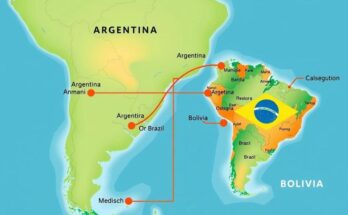The naira’s significant depreciation has enhanced Nigeria’s economic competitiveness, reaching levels not seen in 25 years, according to Chatham House. This change has improved trade surpluses and attracted foreign capital. However, the downturn poses challenges to ordinary citizens as inflation rises and poverty persists. A focus on foreign direct investment and stable economic conditions is vital for the country’s growth moving forward.
The recent depreciation of the naira has positioned Nigeria’s economy to be more competitive than it has been in the last 25 years, as reported by the British think tank, Chatham House. The naira’s value decreased by over 70 percent, dropping from 460 naira to approximately 1,500 naira per dollar—the largest adjustment globally in recent times, surpassed only by the Ethiopian birr. Chatham House states, “With the naira’s fall, Nigeria is arguably now more competitive than at any time in the past 25 years.”
The weakened naira has significantly improved Nigeria’s balance of payments, with a recorded trade surplus of N16 trillion in 2024—one of the highest levels historically. Additionally, this devaluation has attracted foreign capital, boosting Nigeria’s reserves to over $40 billion, which are now on par with the nation’s external debt. Furthermore, the removal of fuel subsidies has helped reduce the fiscal deficit from 6.4 percent of GDP in early 2023 to 4.4 percent by early 2024, providing some financial relief.
However, a cheaper dollar amplifies import costs, potentially widening trade deficits and hindering economic growth. Chatham House cautioned, “Excessively cheap dollars encourage companies and individuals to find ways of getting money out of the country, to park wealth in safer havens at low cost.” While reforms initiated by President Bola Tinubu have begun to stabilize the economy, they also pose significant challenges for the majority of Nigerians, with over 129 million experiencing poverty due to decreased purchasing power.
In order to foster economic recovery, Nigeria must attract foreign direct investment (FDI), essential for enhancing productivity and creating jobs. The report notes with concern that Nigeria has not been able to draw in more than $2 billion in net FDI annually despite its population of 230 million.
Calls for the naira to appreciate against the dollar to curb inflation—currently at an alarming 34 percent—could jeopardize the progress made. Chatham House emphasizes, “A currency that stays competitive is a necessary condition to encourage more productive capital to enter the country.” Additionally, it is vital to maintain stable business conditions to spur investment and growth.
The Central Bank of Nigeria (CBN) has raised interest rates to combat soaring inflation, now at a three-decade high, but it needs to enhance its monetary transmission mechanisms. Currently, while borrowing costs hover close to 30 percent, bank deposit rates are around 10 percent. Higher deposit rates are necessary for controlling inflation and mobilizing domestic savings effectively, supporting infrastructure and social investment projects.
Nigeria’s economic future hinges on balancing currency competitiveness, fostering a stable investment climate, and implementing comprehensive fiscal policies to support recovery and growth.
In conclusion, the depreciation of the naira has rendered Nigeria’s economy more competitive than it has been in 25 years, as stated by Chatham House. While this economic environment has yielded a significant trade surplus and increased foreign reserves, challenges remain—particularly concerning inflation and the impact on ordinary citizens. The necessity for attracting foreign direct investment and maintaining a stable economic framework is critical for Nigeria’s sustained growth. Moreover, appropriate monetary policies, including higher deposit rates, are essential to manage inflation and support development.
Original Source: businessday.ng




